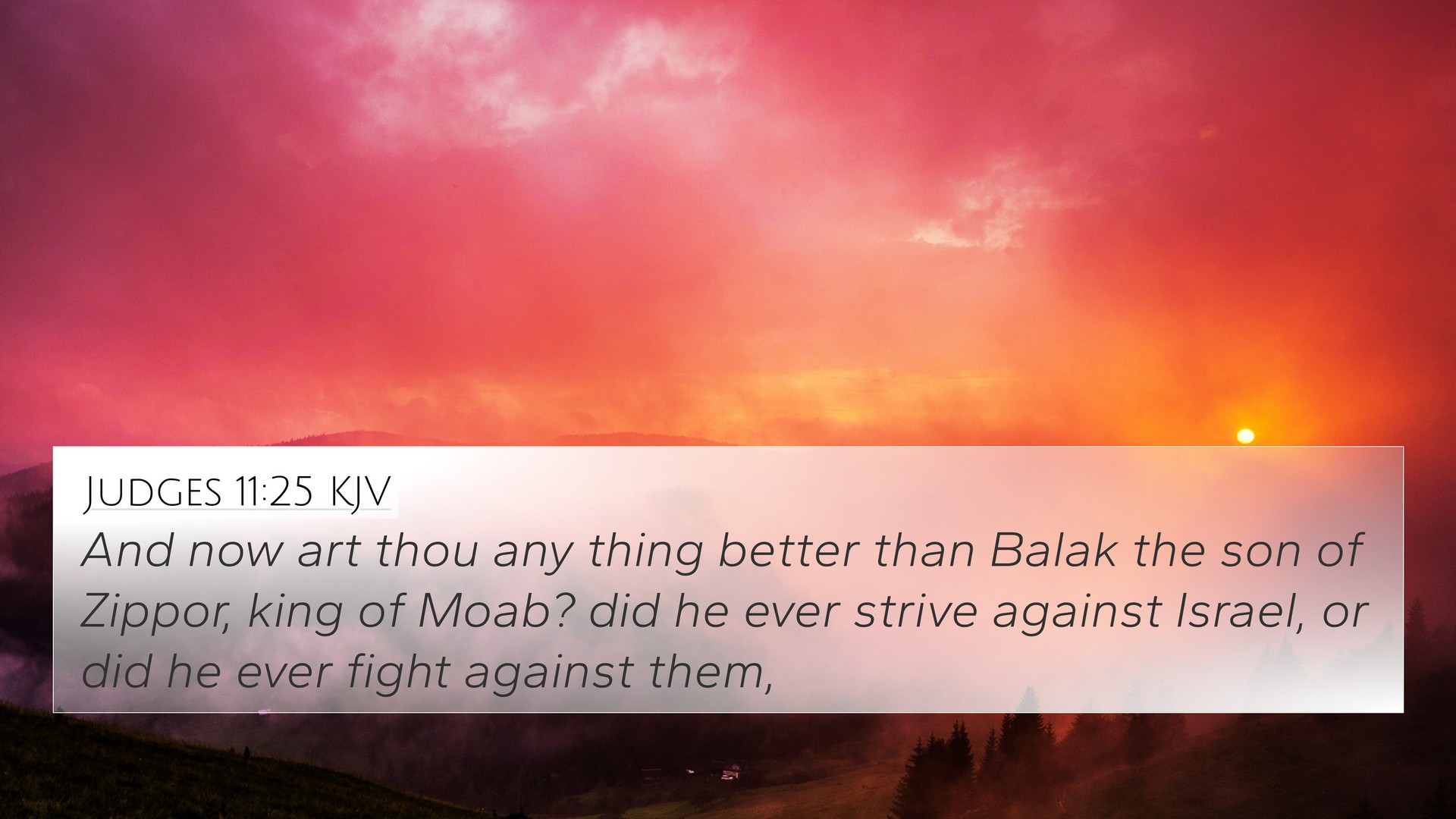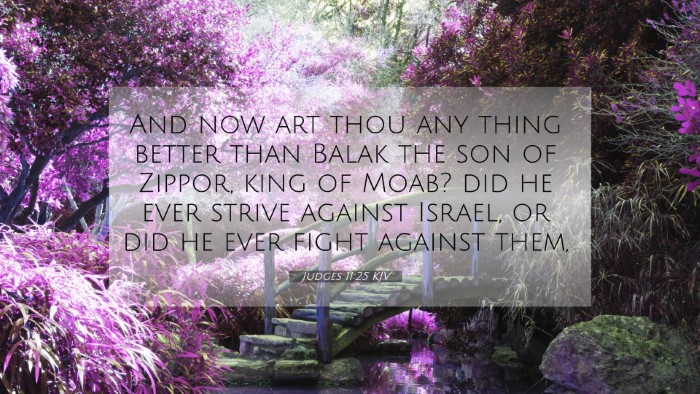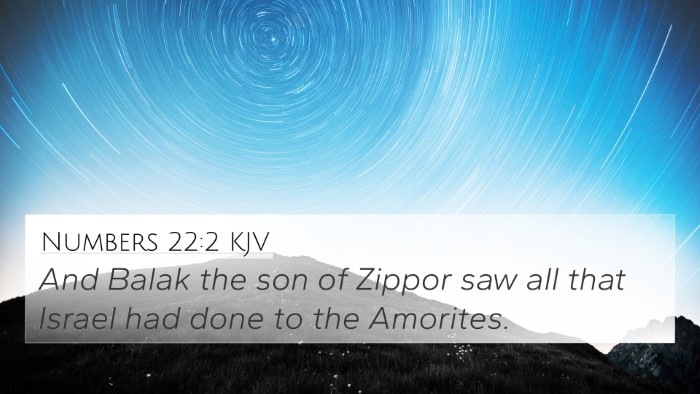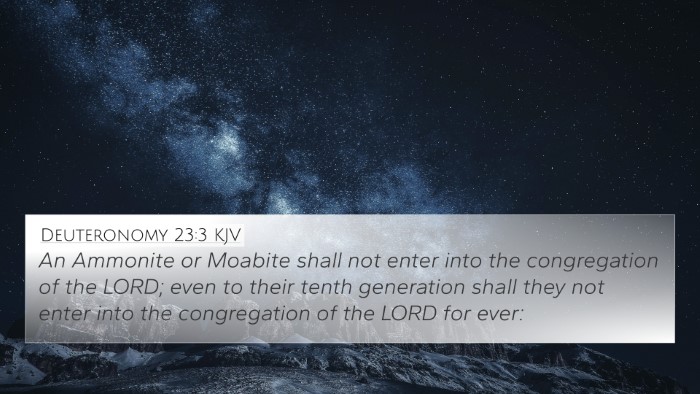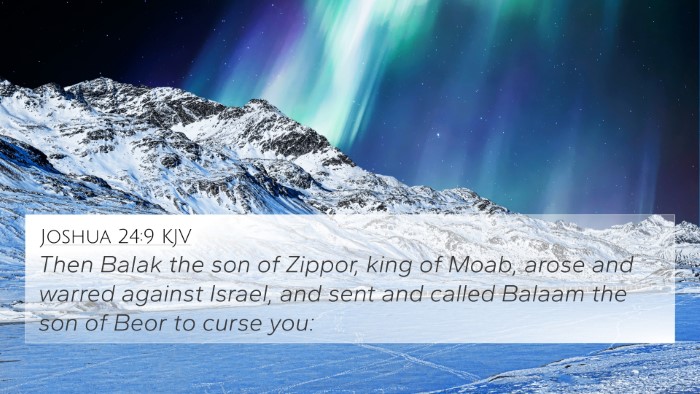Bible Verse Analysis: Judges 11:25
Verse Reference: Judges 11:25 (KJV) - "And now, art thou any thing better than Balak the son of Zippor king of Moab? did he ever strive against Israel, or did he ever fight against them?"
Understanding Judges 11:25
This verse is part of the dialogue given by Jephthah, a judge of Israel, as he responds to the Ammonites’ claims regarding their land. Jephthah's rhetorical question emphasizes Israel's historical right to the land, contrasting their peaceful history with the aggression of the Ammonites. The verse invites deeper examination of the larger narrative and establishes themes of divine providence and the legitimacy of Israel's claim to their territory.
Commentary Insights
Insights from renowned commentaries shed light on the complex theological implications of this interaction:
- Matthew Henry: Emphasizes the significance of Jephthah's argument, indicating that the Ammonites have no legitimate claim against Israel as they have not contended with them like Balak. Henry connects this to God's sovereignty and the protection He provided over Israel.
- Albert Barnes: Highlights that Jephthah's reference to Balak shows the nature of inter-tribal relations, focusing on how Israel has historically dealt justly and peacefully with its neighbors, in marked contrast to the aggressive stance of the Ammonites.
- Adam Clarke: Notes the historical context of the dispute and that Jephthah’s discourse serves not only as a defense but also as a reminder of Israel's divine backing in their territorial claims.
Key Themes and Connections
Judges 11:25 fits into a broader theological context that addresses themes of justice, divine right, and the nature of conflict.
- Divine Justice: The verse illustrates the principle that God established Israel in the land, thus highlighting divine justice in their possession of it.
- Moral Accountability: Jephthah’s question implies that nations are accountable for their actions before God and that unjust aggression leads to divine consequences.
Bible Verse Cross-References
To deepen the understanding of Judges 11:25, the following Bible verse cross-references can be explored:
- Numbers 22-24: The account of Balak, demonstrating his desire to curse Israel.
- Deuteronomy 2:9: God's instruction regarding the Ammonites and their land.
- Psalm 74:18: Reflects on how enemies have treated God’s people.
- 1 Samuel 12:9-11: A reminder of God’s salvation history for Israel.
- Joshua 24:8: The account of Israel's entrance into the Promised Land.
- Romans 8:31: A declaration of God's support for His people against adversaries.
- Exodus 14:14: God’s assurance of fighting for Israel.
Cross-Referencing Biblical Texts
This discourse about Judges 11:25 reveals significant connections between other Bible verses, offering a clearer theological framework:
- Understanding the connections between Bible verses such as the responses of God’s people to challenges throughout scripture.
- The thematic Bible verse connections presented in this chapter link the past struggles of Israel with their present circumstances.
- Such comparative Bible verse analysis reveals a pattern of divine intervention and protection in the face of aggression.
- Inter-Biblical dialogue is also essential when understanding how the history of Israel's conflicts informs our reading of their covenant relationship with God.
Conclusion
Judges 11:25 serves as a powerful reminder of God’s justice and providence. As believers study this verse and its connections to other scriptures, they gain essential insights into God’s nature, His plans for His people, and the historical context of their faith.
This verse's inquiry into the nature of conflict and legitimacy provides a framework not only for understanding this specific historical event but also for applying these lessons to modern faith contexts.
